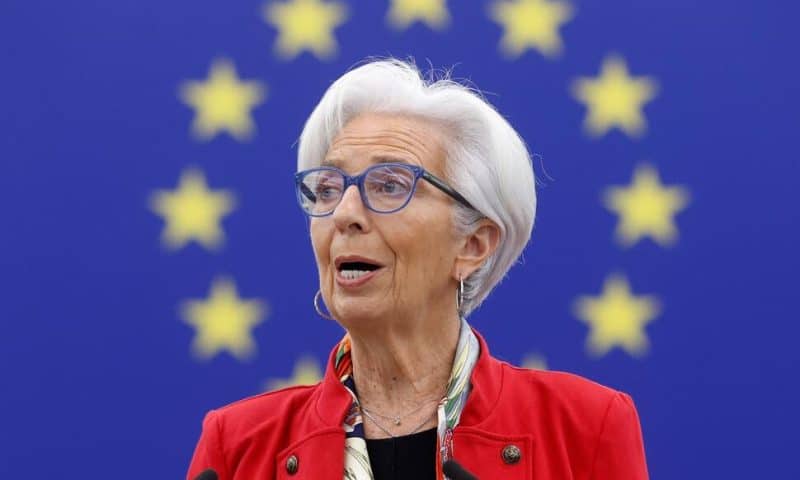European Central Bank President Christine Lagarde is warning that inflation is holding its grip on the economy
FRANKFURT, Germany — European Central Bank President Christine Lagarde warned Tuesday that inflation is holding its grip on the economy and underlined that the bank intends to raise rates high enough to “break this persistence.”
Lagarde acknowledged that inflation has fallen from all-time highs last year as energy prices plunged and the bank rolled out a rapid series of rate increases, which are meant to fight price spikes by making it more expensive for consumers and businesses to borrow and spend.
“We are seeing a decline in the inflation rate as the shocks that originally drove up inflation wane and our monetary policy actions are transmitted to the economy,” she said in a speech opening the ECB’s annual policy conference in Sintra, Portugal.
“But the pass-through of those shocks is still ongoing, making the decline in inflation slower and the inflation process more persistent,” Lagarde added.
Businesses initially passed on their rising costs by charging customers higher prices, a phase that is starting to wane. Now, with unemployment at record lows, workers are demanding higher wages to make up for lost purchasing power — threatening to keep pushing up inflation in a wage-price spiral that the bank must prevent.
Workers, Lagarde said, “have so far lost out from the inflation shock, seeing large real wage declines, which is triggering a sustained wage catch-up process as they try to recover their losses. This is pushing up other measures of underlying inflation.”
She said the ECB needs “to address this dynamic decisively” by raising rates as far as needed. The bank would discourage “expectations of a too-rapid policy reversal” and keep rates high for as long as needed, Lagarde said.
Inflation in the 20 countries that use the euro currency came in at 6.1% in May, heading down from a peak of 10.6% in October after declines in energy prices that surged after Russia’s invasion of Ukraine.
But inflation is well above the bank’s target of 2% considered best for the economy. And core inflation — which excludes volatile food and fuel prices — is stubbornly high at 5.3%. New inflation figures are to be published Friday, with analysts at Deutsche Bank foreseeing another decline in overall inflation to 5.8%.
Higher interest rates can weaken the economy and raise the risk of recession. Europe’s economy already contracted slightly in the last months of 2022 and the first three months of this year, with two straight quarters of falling output being one definition of recession.
Even so, the bank is expected to raise interest rates again by a quarter-percentage point next month.
Lagarde all but promised such a hike at the bank’s meeting this month, repeating in her speech Tuesday that “barring a material change to the outlook, we will continue to increase rates in July.”
Central banks around the world have rapidly increased borrowing costs to combat inflation stemming from the global rebound from the COVID-19 pandemic and Russia’s war in Ukraine.
The U.S. Federal Reserve paused rate rises at its meeting this month, but Chair Jerome Powell, who will speak on a panel Wednesday with Lagarde and other major economies’ central bank chiefs, has said Fed officials expect to raise interest rates further this year.
The Bank of England surprised with a large half-point hike last week.

